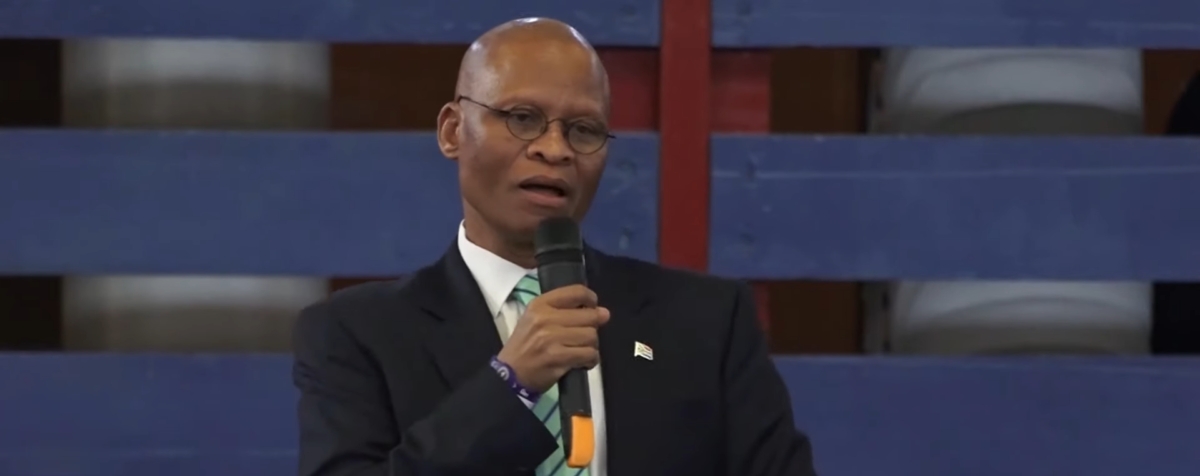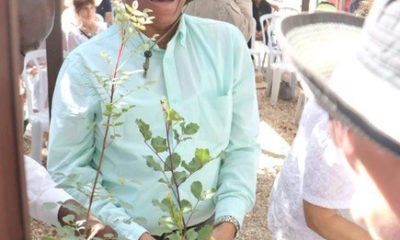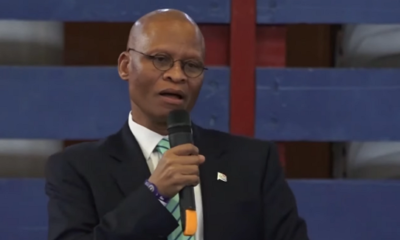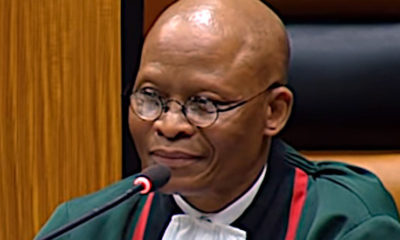
Banner

Mogoeng ruling a moment of reckoning
When news broke on 4 March 2021 that the Judicial Conduct Committee (JCC) had directed Chief Justice Mogoeng Mogoeng to apologise unconditionally for statements he made about Israel, it felt for many like a moment of truth, whether they were supporters or detractors of the chief justice.
Mogoeng was taken to task for comments he made during a webinar in June 2020, and later at a prayer meeting when he doubled down and refused to apologise for what he had said.
Africa4Palestine, the Boycott, Divestment, Sanctions South Africa (BDS SA) coalition and the Women’s Cultural Group laid complaints against him, saying he had flouted rules regarding judicial ethics. The matter was adjudicated by Judge Phineas Mojapelo.
Amongst other points, the chief justice said in the webinar that, “We are denying ourselves the opportunity of being a game changer in the Israeli-Palestinian situation. The forgiveness that was displayed by President Mandela is an asset that we must use around the world.”
Mogoeng expressed support for Israel and the Palestinians, and said, “I’m under an obligation as a Christian to love Israel, to pray for the peace of Jerusalem.” He stressed that he was bound by the policy of the South African government, and didn’t reject it.
But in his judgement, Mojapelo said that Mogoeng had gone too far. “Whether we like it or not, the chief justice isn’t like any other citizen of South Africa. He is the head of the judiciary and is subject to the restraints of that office, including the ethical rules which govern the conduct of each and every single judge. He is subject to those restraints of his office in his official and private capacity,” he wrote.
“Members of the judiciary have a duty individually and collectively to publicly accept their own peer-review process and to strengthen its credibility. Instead, he showed his disregard for the process by flaunting the fact that he would never apologise for his conduct, even [in Mogoeng’s words] ‘if 50 million people marched for ten years’.”
Mojapelo provided the exact words of an apology and retraction that the chief justice must make by 14 March 2021. At the time of going to print, Mogoeng has remained silent.
A senior member of the legal profession in South Africa, speaking on condition of anonymity, said Mojapelo is a respected judge who wouldn’t make a biased ruling. The ruling, he said, was more about Mogoeng “straying into territory he shouldn’t” rather than what he said about Israel. However, he noted that another judge had strongly condemned Israel in the past and was never reprimanded, and “he should have been”.
But writing for Business Day, Milton Shain, emeritus professor of history at the University of Cape Town, noted among other points, “What seems to be drowned out is the vehemence with which his [the chief justice] words were greeted at the outset, as opposed to the relative silence around his comments on the COVID-19 vaccine, not to mention the unusual alacrity with which the JCC has acted on the matter. Should we be surprised? The chief justice deviated from the national script.
“While antagonism towards Israel cannot axiomatically be equated with antisemitism, it’s apparent that the discourse of anti-Zionism often goes beyond the bounds of normal political rhetoric and frequently betrays vulgar Jew-hatred. Israel alone is signalled out for obloquy, while the human-rights abuses of many other states are ignored. Mogoeng made this clear. In so doing, he crossed a red line.”
Meanwhile, Sara Gon, the head of strategic engagement at the Institute of Race Relations, said, “What Mogoeng said about Israel wasn’t particularly inflammatory, even though it seemingly contradicted government policy. He has said far worse in the past, and no complaints have been made.
“The moniker of Israel as an ‘apartheid’ state applied by the ANC [African National Congress] is at risk with Mogoeng’s utterances. This causes a problem because it questions the ANC’s position, yet the ANC supposedly holds that it’s available to act as an ‘honest’ broker in reaching peace. The ANC should have ignored it instead of bringing it up in parliament. Its failure to take action on previous misconduct means it’s an anti-Israel knee-jerk reaction.”
Gon doesn’t think the ruling breaches Mogoeng’s religious rights, and said his right to free speech is limited to the code of conduct. “Judges are required to be careful about their public statements. I suspect if he’d worded it more judicially, he could have got away with it. But he’s operating in a milieu where his words will be watched.
“It is, however, a question of seriousness and, other than offending certain groups, it hasn’t been a crisis anywhere near the crisis that has beset the judicial system by the failure of the JCC to get to grips with the matters against Judge [John] Hlope over more than a decade. The contrast is disgraceful.”
Rowan Polovin, the national chairperson of the South African Zionist Federation, said the organisation was concerned by the ruling for three reasons. “First, the original comments of the chief justice were legitimate, fair, and impartial. They gave full credence to both sides of the Israeli-Palestinian conflict. His comments were in line with South African foreign policy, and he took care to note that he is bound by South African government policy on the issue.
“Second, the effect of this ruling is to make balanced – let alone pro-Israel – positions politically controversial in this country. If the chief justice had expressed an anti-Israel position, he would have been applauded by those who instead seek to damage him. This falls in stark contrast to judges who have taken political positions or expressed an opinion on controversial matters but have never been questioned or sanctioned.
“Third, this leads to a form of ‘cancel culture’ in our country. If one is not blatantly anti-Israel, then one’s comments aren’t accepted in the political discourse. It leads to a chilling effect, where pro-Israel or even balanced opinions are silenced. The JCC in this matter may have handed the government a blank cheque to silence those with whom it disagrees through this ruling.”
Others saw the fight as just beginning, and boldly expressed their support. “The chief justice must never and will never apologise for praying for the peace of Jerusalem,” said South African Friends of Israel (SAFI) spokesperson and radio personality Bafana Modise. “If you expect an apology, forget about it. We serve the G-d of Israel. Israel is the homeland of Christianity. We will not be silenced by you. Chief Justice must not ever and will never, ever, apologise for praying for Israel. We will never apologise for praying for the G-d of Israel.”
SAFI and other Christian organisations have created a petition calling for “President Cyril Ramaphosa to publicly support [Mogoeng] and his right to speak out and express his Christian views to bless Israel and pray for the peace of Jerusalem.” At the time of writing, 114 600 people had signed it. One supporter wrote, “I’m signing because we still live in a country with free speech. Why can those opposing Israel speak out, but Christians that support Israel must be muted?”
African Christian Democratic Party leader Kenneth Meshoe, who founded the non-profit organisation Defend Embrace Invest (In) Support Israel (DEISI), said in response to the ruling, “The JCC’s finding … is very disturbing and unsettling. DEISI views this finding as a threat to the religious freedom of all South Africans, particularly members of the Judeo-Christian faith.”
Vivienne Myburgh, the national director of the South African Branch of the International Christian Embassy Jerusalem, said, “We fully support the right of [Mogoeng] to express his Christian convictions and support for peace in the holy land, and we denounce those who are mischievously misinterpreting his message towards their hateful agenda.
“His message has been one of love for all people caught up in the Israeli-Palestinian conflict. He should be applauded for his impartial and unprejudiced stance. This kind of calumny actually exacerbates divisions and increases religious and social tensions at home and in Israel. Any attempt to abrogate [his] constitutional freedom should cause all peace and freedom-loving South Africans to be most wary and alarmed.”











Shirley Modlin
March 13, 2021 at 1:22 pm
What is happening to this country is sad, when one can’t express
a point of view . I’m proud of CHIEF JUSTICE MOGOENG MOGOENG for
taking a stand.